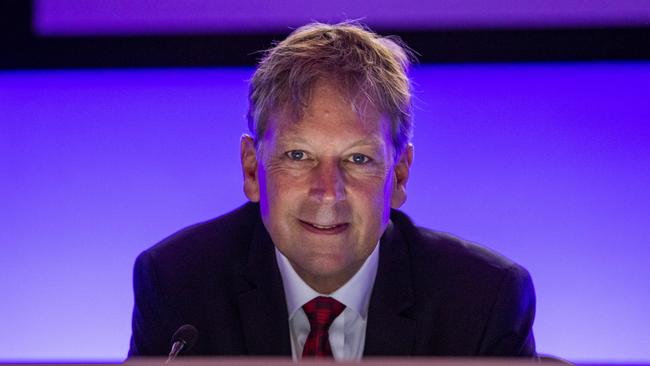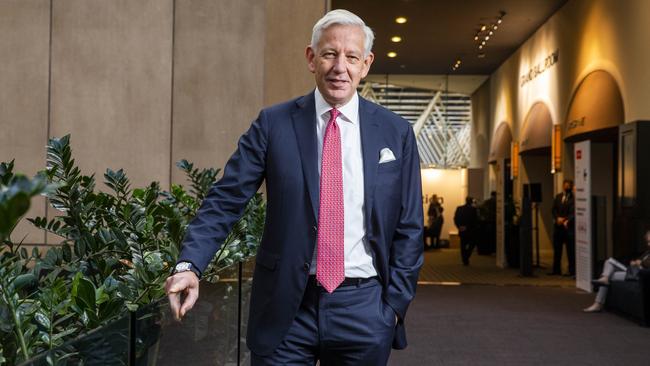Rio Tinto boss Jakob Stausholm says Australia is not developing renewable energy sources fast enough
Rio Tinto boss Jakob Stausholm says Australia is not developing renewable energy sources fast enough to cope with the coming exit of coal.

Rio Tinto chief executive Jakob Stausholm has weighed in on the election-season energy debate, saying the development of renewable energy sources needs to be accelerated to cope with the exit of coal-fired power plants.
Rio is one of the biggest energy users in the country, both at its giant Pilbara iron ore mines – where the company owns its own generators – and in the east coast grid, where its aluminium smelters in Gladstone and Newcastle are some of the biggest power users.
Both currently rely on coal-fired generators to supply the majority of their electricity and, along with other aluminium producers, Rio has for years complained that the high-cost of energy in the national electricity market has undermined their competitive viability.
Origin Energy’s announcement in February that it plans to close the Eraring plant in NSW seven years ahead of schedule in 2025 has ensured the future of Australia’s coal-fired power fleet has again featured in the federal election campaign.
In early April, energy minister Angus Taylor proposed new rules to force power utilities to give five years notice of their intention to close power stations, and last week Nationals minister Bridget McKenzie backed the construction of new coal-fired power plants if they include carbon capture and storage technology.
But, asked whether the early closure of coal plants would add new threats to the viability of Rio’s smelters and other energy-intensive operations, Mr Stausholm said – while admitting he was not an expert in building or running energy networks – that he believed Australia should instead accelerate the introduction of renewable power into its energy mix.
“It’s very clear – and it’s not just in Australia – we are just not developing renewable energy fast enough. That’s where we need to put our focus,” he said.
“The way we live is that we cannot just reduce our use of energy as Western societies. So we need energy and if renewable energy goes slow, then of course you cannot phase out any fossil fuel.”

Rio Tinto last year announced plans to spend about $US7.5bn ($10bn) to slash its scope 1 and scope 2 emissions in half by 2030, saying it will spend billions to build renewable energy plants to power its Pilbara operations and its east coast smelters.
Mr Stausholm said that as a major power user, Rio intended to play its part in building wind and solar power plants near its own operations, saying Australia’s abundant access to renewable energy sources was a major advantage compared with other developed nations.
“If I focus on the long term, I think it’s going to be crucial for Australia to tap into its next competitive advantage, which is access to renewable energy,” he said.
“I think what we have learned here over the last year is that if you are not focusing on the energy sources you have today, then you’re going to create problems. That’s also why my philosophy is always not pointing the finger at fossil fuels, but much more about focusing on what we can do to stimulate developing renewable energy.”
While the fallout from Russia’s invasion of Ukraine has elevated the energy crisis in Europe, with threats to Russian gas supply increasing demand for coal in the short term, Mr Stausholm said the crisis also highlighted the need for more renewable energy development.
“I come from Denmark and Western Europe is very, very dependent on fossil fuels from Russia. So there are some very difficult questions to be asked in Western economies,” he said.
And while shareholder questions at Rio’s Melbourne annual meeting largely focused on environmental, social and governance issues, incoming Rio chairman Dominic Barton also sounded a warning on broader geopolitical threats to the both the company’s business and the global economy, telling shareholders tensions with China could not be allowed to escalate towards direct conflict.
Mr Barton built strong links in China in his 30-year employment with McKinsey, and was appointed as Canada’s ambassador in Beijing to help ease tensions between the two countries in the wake of the arrest of Huawei chief financial officer Meng Wanzhou in Canada in response to an extradition request from US authorities.
Responding to a question on how Rio would deal with potential bans on the sale of iron ore to China if tensions with Australia’s top trading partner deteriorated, Mr Barton said Australia and its allies could not allow tensions to reach the point of outright conflict that led to the kind of economic separation forced upon Russia after its invasion of Ukraine.
Mr Barton became the Rio chairman at the close of Rio’s annual Australian shareholder meeting, and told shareholders he thought outright conflict with China was highly unlikely, but said the consequences would be devastating.
“If the world ever got to that point, if you think about the integration of the Chinese economy with the world economy, we’re in a devastating situation. The integration of the economies between China and the rest of the world is so deep, it’s completely different to Russia,” he said.
“Everyone would have to think about, under those sorts of consequences, about what that would do. I think it would be horrendous.
“I don’t think we’re anywhere near that type of situation.”








To join the conversation, please log in. Don't have an account? Register
Join the conversation, you are commenting as Logout